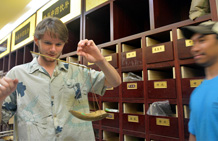
Prague Declaration on Health Cooperation and Development with Central and East Europe
Source: en.nhfpc.gov.cn
Updated: 2015-06-19
At the first Sino-Central and Eastern Europe Health Ministers Forum, in the city of Prague, capital of the Czech Republic on June 16, there were impressive results When the Prague Declaration on Health Cooperation and Development Between China and Central and Eastern Europe countries was announced, with the emphasis on health exchanges and cooperation, bilateral friendship, and a partnership involving peace, growth, reforms, civilization and continued development.
There were many ministerial discussions centered on post-2015 sustainable development in health and universal health coverage, and Sino-European medical integration, with the shared idea that health is the driving force behind sustainable development and a prerequisite for social and economic development.
Over the past 15 years, China and Central and East Europe have focused on the UN millennium development goals and worked hard to bring down infant mortality rates, improving women’s health and fight HIV/AIDS and malaria and the ministers said they agree on supporting the UN in making health the main part of their post-2015 sustainable development goal, and developing an evaluation index, finding innovations in health financing, improving global health governance, and the health and well-being of people worldwide.
The declaration says that economic globalization, urbanization, and an aging population bring many global health Challenges and that China and the European countries should adopt a more open attitude, and increase personnel, technology and information exchanges based on a principle of mutual learning and benefit for winning results, and develop cooperation projects to improve the health of their people. It restated that the role of universal health coverage as an effective way to bring "health to all" and promote equal access to health benefits worldwide. China and the European countries have explored a strategy for increased health service accessibility, better health service quality, and reduced poverty in relation to illness to narrow the health gaps between regions.
The declaration calls for more input from the international community, use of all forces, increased health system equality and efficiency, better health institutes and personnel and development capacity and a shift of focus to underdeveloped areas and vulnerable groups, since universal health coverage plays an important role in social stability and economic development. The ministers praised the forum's effect on Sino-European health cooperation and emphasized the need for all parties to increase cooperation and use their resources to support cooperation.
The declaration has the following proposals: one, China and Central-East European medical institutes increase direct communications and that a public hospital cooperation network be established; two, China and the European countries increase exchanges on infectious disease monitoring, prevention, control and response, and chronic non-communicable disease prevention and management and build a public health institute alliance; three, support joint health system studies and regular seminars for joint exploration of health systems suitable for each individual country's conditions and long-term health system development; four, increase health professional and technical personnel exchanges for greater understanding and trust between the countries, and provide special scholarships for Europeans for medical studies in China; and, five, increase communication and coordination with the World Health Organization and other international organizations to help them play a greater role in global health governance.
The ministers said they all believe that health cooperation between China and Europe through the cooperation framework is extremely significant and that regional health cooperation can offer a way for government officials, experts, scholars and company representatives from both areas to communicate with and complement each other, and it can increase the breadth and depth of participation of all countries in global health governance. Therefore, the ministers have decided to institutionalize the Sino-Central and Eastern Europe Health Ministers Forum and hold it every two years to seek more cooperation.

World Family Summit
The World Family Organization was founded in Europe in 1947 and headquartered in Paris.
Link: China's Central Government / World Health Organization / United Nations Population Fund / UNICEF in China
Copyright 2014 National Health and Family Planning Commission of the PRC All rights reserved






